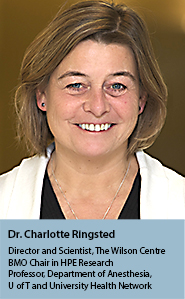Dr. Charlotte Ringsted
Title – Why and how surgeon pioneers learn novel procedures

Date: Wednesday, May 21, 2014
Time: 12:00pm to 1:30pm (Lunch will be served at DHCC)
Locations:
- Diamond Health Care Centre 2267
- IRC 305
- MSB 107
- KGH CAC 237
- NHSC 9-374
- FSJH 0715
- Surrey Central City (Manning Room)
Abstract
Little is known about how experienced surgeons learn a completely new operating technique, in particular in the early days when pioneers take on a new procedure without having a more experienced teacher on-site. One example is changing from open surgery to minimal access surgery. Theories on expertise development include the role of self-regulatory learning processes that to some extent offer a framework for this situation. However, the theories of deliberate practice and expertise development are mainly based on studies from outside the biomedical domain, i.e. sports, arts, and cognitive-oriented areas. These domains focus on individual development without environmental constraints such as concerns for patient safety and quality of care. Furthermore, a key aspect of the current theories is the role of a coach which is lacking when pioneers learn a new procedure. In particular, the development of meta-cognitive learning skills is to some extent dependent on the feedback and stimulation by a coach.
On this background, we explored why and how surgeon pioneers of Video-Assisted Thoracic Surgery (VATS) learned this novel approach to lobectomy without a coach on-site. The results indicate some strategies that may inform clinical training programmes as well as programmes of continuous professional development and advancement of medical technology in an era of patient safety.
Biography
Charlotte Ringsted was appointed as Director of the Wilson Centre in February 2013 and Professor, Department of Anesthesia, University of Toronto and University Health Network, Toronto, Canada. She holds the BMO Chair of Health Professions Education Research and has been the honorary professor at Maastricht University since September 2013. She trained as an anesthesiologist in Denmark and pursued medical education full time in the 1990s, completing both a Masters and PhD at Maastricht University in the Netherlands.
She established a clinical skills lab in Copenhagen University Hospital in 1995 and served as leader of the Postgraduate Medical Institute for Copenhagen Hospital Corporation 1997-2004. In 2004 she became the director of the Centre for Clinical Education, University of Copenhagen and Capital Region, Denmark. She is a prolific scholar with over 150 publications, and has presented her work extensively internationally. She was member of the AMEE board during 2004-2011 as well as a designer of the course Research Essential Skills in Medical Education (RESME), and has been the program director of this course that has run annually since 2007.
Her current areas of research are training and assessment of clinical skills in clinical and laboratory settings, virtual reality/simulation-based training, inter-professional teamwork, workplace-based assessment and the role of students and patients as teachers.
Accreditation:
As an organization accredited to sponsor continuing medical education for physicians by the Committee on Accreditation of Canadian Medical Schools (CACMS), the UBC Division of Continuing Professional Development designates this educational program as meeting the accreditation criteria of the College of Family Physicians of Canada for up to 1.5 Mainpro-M1 credits (per session). This program has been reviewed and approved by UBC Division of Continuing Professional Development. Each physician should claim only those credits he/she actually spent in the activity.
Accreditation Statement:
The CHES Research Rounds is a self-approved group learning activity (Section 1) as defined by the Maintenance of Certification program of the Royal College of Physicians and Surgeons of Canada.
